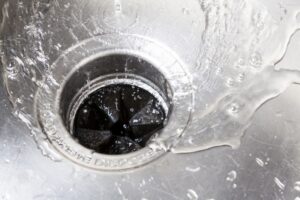Did you know that one of the busiest days of the year for plumbers in the US is the day after Thanksgiving? There are several reasons for this, and one of them is because of abuse of garbage disposals. To avoid clogged drains, check out effective ways to get rid of drain clogs the right way instead of relying on harmful DIY methods.
The garbage disposal in a house that’s hosting a Thanksgiving feast can go through some rough times during meal preparation and clean up. Often, all that stress (as well as mistakes about what shouldn’t go down the disposal) can mean a busted sink disposal and clogged up drains.
Since it’s almost Thanksgiving—and you’ll probably have feasts in December as well—we want to help out with tips on how to keep your disposal in good shape so you don’t have to depend on us for kitchen plumbing in Tampa, FL on Black Friday.
What Your Garbage Disposal Can’t Handle
Unfortunately, many people treat their disposals as if they were invincible industrial machines that can grind up anything. This isn’t true, and here’s a list of what to keep out of your disposal:
- Hard food waste: What food waste is too hard for a disposal to handle? The simple test is to ask yourself if it’s something your teeth can chew. If you can’t chew it, the disposal can’t grind it. This includes items like any type of meat bone, fruit pits, and unpopped popcorn kernels. Oh, and coffee grounds.
- Actual garbage: Any non-organic waste goes in the trash, not the disposal. Casually tossing plastic or paper items down the disposal is one of the quickest ways to break the mechanical mechanisms inside it.
- FOG: This stands for fats, oils, grease—a deadly trio that is the sneakiest of all enemies of sink disposals. The cooking byproducts look harmless when in hot liquid form. Then they cool off and turn into waxy solids that are just the worst when it comes to the moving parts of a disposal. They’ll clog up your drains fast as well. Pour FOG into a separate receptacle and put it in the actual trash. For additional tips on avoiding clogs, see common summer plumbing issues that could arise year-round.
- Fibrous foods: This includes celery, asparagus, and onion skins. The long fibers of these foods can become entangled in the moving parts of the disposal and cause it to break.
- Pasta and rice: These are foods that absorb water, which makes them potentially destructive for disposals if they become lodged into them.
Other Disposal Tips
Here’s other disposal advice to keep in mind.
- The “ice cube method” doesn’t work: You’ve probably heard this before: you can sharpen the blades of your disposal by pouring ice cubes into it and running it. Well, garbage disposals don’t have blades. They use blunt impellers to hurl food against a grind ring. Ice cubes are too hard for the disposal and may damage it.
- Always run water when the disposal is on: Don’t dry-run the disposal! You need water to wash down the food waste and to help the moving parts run. You’ll hear different advice about whether to run hot or cold water, but it doesn’t make much difference.
- Replace when it’s time: You can expect a disposal to run for 10–15 years. After that point, it’s time to invest in a new one. If you’re unsure about replacing fixtures or appliances, read why it’s important to call a professional plumber for your bath remodel for more advice on ensuring the right upgrades.
Call The Clean Plumbers—the one with the bubbles on the trucks.

